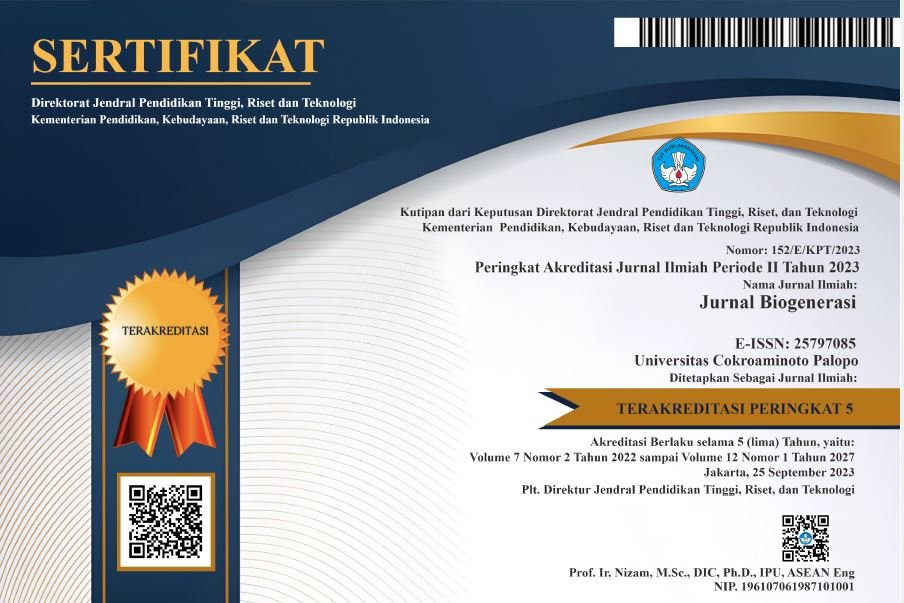PENGARUH MODEL PROBLEM BASED LEARNING BERBANTUAN MEDIA WORD SEARCH PUZZLE TERHADAP KETERAMPILAN KOMUNIKASI ILMIAH PESERTA DIDIK KELAS X FASE E DI SMAN 1 KOTANOPAN
DOI:
https://doi.org/10.30605/biogenerasi.v9i2.4809Keywords:
Problem Based Learning, Word Search Puzzle, Scientific Communication SkillsAbstract
The aim of this research is to determine the effect of the model Problem Based Learning Media assisted Word Search Puzzles on the scientific communication skills of class X Phase E students at SMAN 1 Kotanopan. This research is an experimental research design Randomized Control Group Posttest Only Design. Sampling using techniques deliberate sampling namely sampling based on certain criteria. Class X-1 is the experimental class and class X-3 is the control class. The data analysis technique used is test independent sample t-test The prerequisite tests are first carried out, namely the normality test and homogeneity test. The research results showed that the scientific communication skills of students in the experimental class were higher than those in the control class. The results of the hypothesis test show a significance value of 0.021<0.05. So it can be concluded that the application of the model Problem Based Learning media assisted Word Search Confusing has a positive effect on students' scientific communication skills.
Downloads
References
Arends, R. I. (2013). Learning to Teach. New York: McGraw-Hill Companies.
Jeon, S., & Park, J. (2013). Analysis on Communication Skills in Science Education. 36(Education), 18–21.
Levy, O. S., Eylon, B. S., & Scherz, Z. (2009). Teaching scientific communication skills in science studies: Does it make a difference? International Journal of Science and Mathematics Education, 7(5), 875–903.
Maulidia, L., Nafaridah, T., Ahmad, Ratumbuysang. Monry FN, & Sari, E. M. (2023). Analisis Keterampilan Abad Ke 21 melalui Implementasi Kurikulum Merdeka Belajar di SMA Negeri 2 Bajarsari. SeminarNasional (Prospek II), Prospek Ii, 127–133.
Mutiani, M., & Faisal, M. (2019). No Urgency Of The 21st Century Skills And Social Capital In Social Studies. The Innovation of Social Studies Journal, 1(1).
Patacsil, F. F., & Tablatin, C. L. S. (2017). Exploring the importance of soft and hard skills as perceived by it internship students and industry: A gap analysis. Journal of Technology and Science Education, 7(3), 347–368.
Pramesti, O. B., Supeno, S., & Astutik, S. (2020). Pengaruh Model Pembelajaran Inkuiri Terbimbing Terhadap Kemampuan Komunikasi Ilmiah dan Hasil Belajar Fisika Siswa SMA. Jurnal Ilmu Fisika Dan Pembelajarannya (JIFP), 4(1), 21–30.
Puspita Dewi, A., Muh.Tawil, & Sitti Rahma Yunus. (2023). Pengaruh Media Mencari Kata Terhadap Hasil Belajar IPA Kelas VII SMP Telkom Makassar. Diklabio: Jurnal Pendidikan Dan Pembelajaran Biologi, 7(1), 90–97.
Qodry, I., Nuroso, H., & Susilawati, S. (2016). Pengaruh Model Pembelajaran Problem Based Learning melalui Pendekatan Saintifik terhadap Kemampuan Berkomunikasi Ilmiah pada Kelas X di SMA Negeri 1 Rembang. Jurnal Penelitian Pembelajaran Fisika, 7(1), 34–42.
Rahmadani. (2019). Metode Penerapan Model Pembelajaran Based Learning (PBL). Lantanida Journal, 7(1), 75–86.
Ratimah, Suriyana, & Nurdiana, R. (2024). Efektivitas Strategi Student Team Heroic Leadership Terhadap Kemampuan Pemahaman Konsep Pada Materi Bilangan Berpangkat Di Smp Darudda’wah Punggur. Jurnal Matematika Dan Ilmu Pengetahuan Alam, 4(2), 21–32.
Ridzal, D. A., Rosnawati, V., Haswan, H., Kaharudin, L. O., Ridwan, R., & Yandi, Y. (2022). Pengaruh Pendekatan Saintifik Terhadap Keterampilan Komunikasi Dan Pemahaman Konsep Materi Pencemaran Lingkungan. Biodik, 8(2), 145–153.
Sandria, P., & Syahri, M. (2023). Penerapan Media Pembelajaran Word Search Puzzle Untuk Meningkatkan Keaktifan Belajar Siswa. Bhineka Tunggal Ika: Kajian Teori Dan Praktik Pendidikan PKn, 10(2), 224–230.
Schultz, D. M. (2010). A university laboratory course to improve scientific communication skills. Bulletin of the American Meteorological Society, 91(9), 1259–1266.
Vossoughi, H. (2009). Using Word-Search-puzzle Games for Improving Vocabulary Knowledge of Iranian EFL Learners. 1(1), 79–85.
Downloads
Published
How to Cite
Issue
Section
License
In submitting the manuscript to the journal, the authors certify that:
- They are authorized by their co-authors to enter into these arrangements.
- The work described has not been formally published before, except in the form of an abstract or as part of a published lecture, review, thesis, or overlay journal.
- That it is not under consideration for publication elsewhere,
- That its publication has been approved by all the author(s) and by the responsible authorities – tacitly or explicitly – of the institutes where the work has been carried out.
- They secure the right to reproduce any material that has already been published or copyrighted elsewhere.
- They agree to the following license and copyright agreement.
License and Copyright Agreement
Authors who publish with this journal agree to the following terms:
- Authors retain copyright and grant the journal right of first publication with the work simultaneously licensed under Creative Commons Attribution License (CC BY 4.0) that allows others to share the work with an acknowledgment of the work's authorship and initial publication in this journal.
- Authors are able to enter into separate, additional contractual arrangements for the non-exclusive distribution of the journal's published version of the work (e.g., post it to an institutional repository or publish it in a book), with an acknowledgment of its initial publication in this journal.
- Authors are permitted and encouraged to post their work online (e.g., in institutional repositories or on their website) prior to and during the submission process, as it can lead to productive exchanges, as well as earlier and greater citation of published work.


.png)

